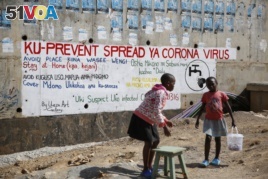10 April 2020
Health officials have predicted that some African countries will have many thousands of coronavirus cases by the end of April.
African health care systems are less prepared to treat serious infectious diseases than ones in Europe, Asia or any other part of the world. African hospitals also lack important health care equipment.
As of Tuesday, there were more than 6,000 coronavirus cases in African. John Nkengasong told reporters that number is "very, very close" to where Europe was after a 40-day period. Nkengasong is the head of the Africa Centers for Disease Control and Prevention, or Africa CDC.

Two young girls sell groundnuts in front of an informational mural advising on precautions to avoid catching the new coronavirus, in the Kibera slum, or informal settlement, of Nairobi, Kenya Thursday, April 2, 2020.
The virus "is an existential threat to our continent," he said. Almost all of Africa's 54 countries have reported cases of the coronavirus after Malawi reported its first case last week. Local transmission has been reported in many places.
Nkengasong said officials are "aggressively" seeking medical equipment such as ventilators: devices that help sick patients breathe. Officials also are exploring local manufacturing and repurposing.
"We've seen a lot of goodwill expressed to supporting Africa" from partners in the international community, Nkengasong said. But he and others are waiting for those feelings to turn into action.
Matshidiso Moeti is the director for Africa at The World Health Organization, or WHO. She told reporters the WHO does not know how many ventilators are available across the region to help people with breathing problems from COVID-19, the disease caused by the coronavirus.
"We are trying to find out this information from country-based colleagues," Moeti said. "What we can say without a doubt is there is an enormous gap."
Some countries have only a few ventilators. For example, the Central African Republic has just three.
WHO official Zabulon Yoti said only a small percentage of people who are infected will need ventilators while about 15 percent may need intensive care.
African health officials are calling for the world to work together at a time when even the richest countries are struggling with the medical crisis.
"Countries like Cameroon just reached out yesterday, Ivory Coast, Burkina Faso, asking, ‘Look, we need tents because we're running out of hospital beds already,'" Nkengasong said.
Even if equipment is found, getting it to countries is a growing problem. Africa's travel restrictions are spreading although some countries have given permission to flights carrying supplies or humanitarian aid.
Estimating the number of coronavirus cases in Africa is difficult, even in South Africa, the most developed country in the region. Officials there have had problems with testing.
Other countries suffer from a shortage of testing supplies. But, 43 countries in the WHO Africa sub-Saharan region are now able to perform tests. That is up from two in early February.
As more African countries establish lockdowns, the WHO and Africa CDC have expressed concern for the millions of poor people who need to go out daily to earn their living. This is a huge problem, Moeti said, noting that hundreds of thousands of children also are now out of school.
It is too soon to tell how the lockdown in places like South Africa has affected the number of cases, she added.
Health experts in Africa are working to understand whether some conditions, such as Africa's young population, might help in fighting off the virus. It is estimated that about 70 percent of Africans are under age 30. Experts are also studying how the widespread problems of poor nutrition, HIV and other diseases might affect people's ability to fight off infection.
"Our greatest fear" is that programs dealing with those ongoing issues will be harmed by the current crisis, Nkengasong said.
I'm Pete Musto.
The Associated Press first reported this story. Pete Musto adapted it for VOA Learning English. Mario Ritter, Jr. was the editor. We want to hear from you. Write to us in the Comments Section.
_______________________________________________________________
Words in This Story
existential –adj. related to existence
continent –n. a very large landmass
transmission –n. passing from one person to another
colleague –n. a fellow worker
region –n. an area separate from others, often very large
enormous –adj. very large
gap –n. a space between two things
tent –n. a shelter made of cloth
lockdown – n. forcing prisoners into the cells or measures to keep people in their homes